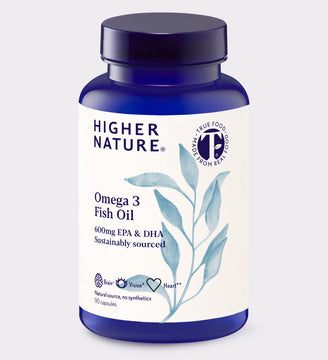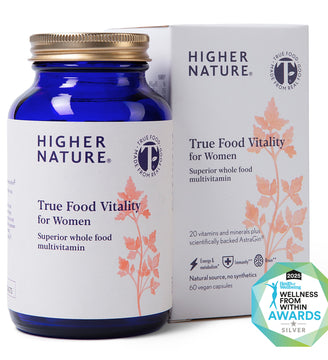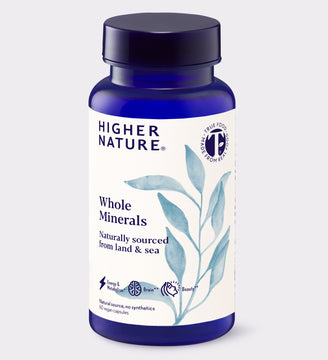
Memory and cognitive health
Elizabeth Houston - Higher Nature Nutritional Therapist - Dip BCNH mbant mCNHC
Many of us have concerns about our memory and concentration. Recalling names and recent events can become increasingly difficult and can make us worry about dementia. Most people have memory issues occasionally, these can be triggered by stress, menopause, lack of sleep, alcohol use etc so not necessarily a symptom of brain degeneration. Some memory loss is part and parcel of an ageing brain, however there are many things we can do to feed the brain supportive nutrients and help improve our memory and cognitive health.
Homocysteine
Try to include more green vegetables, eggs, whole grains and lean meat. These foods are rich in B vitamins. B vitamins play a variety of important roles for our brain health. Vitamins B3, B5 and B12 support mental performance, vitamin B5 is important for the production of some neurotransmitters and vitamins B3 and B12 also aid normal psychological function. Homocysteine is a naturally occurring amino acid which is produced by the body during a process known as methylation. Homocysteine levels in the body are usually low as it is rapidly metabolised, however this process relies on adequate levels of vitamins B6, B12 and folic acid. If these vital nutrients are low in your diet, homocysteine levels can build up. High homocysteine levels are linked to conditions such as heart diseases as it is thought to damage the walls of the blood vessels, but it is also thought to be linked to an increase in brain conditions such as dementia.
Fish oil
Another factor in cognitive decline is thought to be inflammation. Scientists have identified that a deficiency of DHA, a component of omega 3 fish oils, is linked to poor memory function, as DHA is needed for the proper functioning of the brain. Most people in the UK are not eating enough oily fish, Think SMASH - salmon, mackerel, anchovies, sardines and herring. Try to include as many portions of oily fish per week as possible but avoid high levels of the larger species such as shark and swordfish that may have high levels of mercury. For those who don’t like fish, supplementation is an option, choose a good quality one that uses oil from the body of the fish and that has high levels of EPA and DHA.
It should be noted that the benefits of supplementing omega 3 in people with poor cognitive function are enhanced when adequate B vitamin statues is achieved so a combination of the two should be considered.
Other fats found in oily fish that have been shown to improve memory include Phosphatidylserine (phospholipid) this forms part of cell membranes and is found in higher quantities in the brain. This is also found in soya lecithin and supplements.
Gut microbiome
By now most people know that the key to good digestive health is ensuring a good balance of the microbes that live in our gut. However we are discovering now how important the health of the gut is linked to our brain health. Our brain is connected to our gut via the Vagus nerve, the Vagus nerve is responsible for carrying information from your gut to your brain and efferent nerves that send signals from your brain to the muscles of your stomach and intestines.
Did you know 90% of the happy hormone serotonin is made in the gut? This is partly why conditions such as IBS flare up when under stress. The brain and gut constantly ‘talk’ to each other known as the gut-brain axis. It is vital to consider gut health when trying to nourish the brain, research has found that taking live bacteria or probiotic supplements may help boost mood and cognitive function and lower stress and anxiety. For Further information od gut health please visit here.
Mediterranean diet
There is strong evidence that eating a Mediterranean diet protects the brain, this way of eating is focused on a high nutritional quality balanced diet with a key focus on high levels of healthy fats from olive oil, avocados, oily fish, nuts, seeds and lots of fresh vegetables such as tomatoes and concentrated tomato paste etc, and low levels of processed foods, red meats and sugar. Scientists believe one of the causes of age-related cognitive decline is due to damage to brain cells/DNA by oxidation, this can be caused by inflammation. Fruit and vegetables are rich in antioxidants so eating a wide variety in a rainbow of colours will be good for your mental health as well as overall wellbeing.
Hydration
5-6 cups of fluid per day, making sure to include water, is essential. Insufficient fluid to the brain can make it sluggish, leading to confusion and memory problems.
Ginkgo Biloba
Studied extensively, this herbal remedy is known as a traditional remedy for memory. It is believed to help the circulatory system in the brain and improve cognitive function.
Exercising daily
Walking, dancing or swimming is ideal at any age. Daily exercise provides the brain with 25% of the body’s blood supply, bringing essential oxygen and nutrients needed to maximise brain function.
Learning something new
Studies have proven that specifically exercising the brain, for example by learning a musical instrument or language, encourages it to make new nerve pathways and stimulates regions involved in memory function.
Sleep
Adequate sleep is vital for memory, focus and general well-being. During sleep not only are you resting the brain but this is the time that you will be storing memories. Lack of sleep also impacts our concentration during the day. For more information on sleep please visit here
Stress
Our brains are well equipped to handle short bursts of stress by triggering the flight or fight response, this type of stress can actually be beneficial for memory, however long term stress can be very harmful to brain health.

















